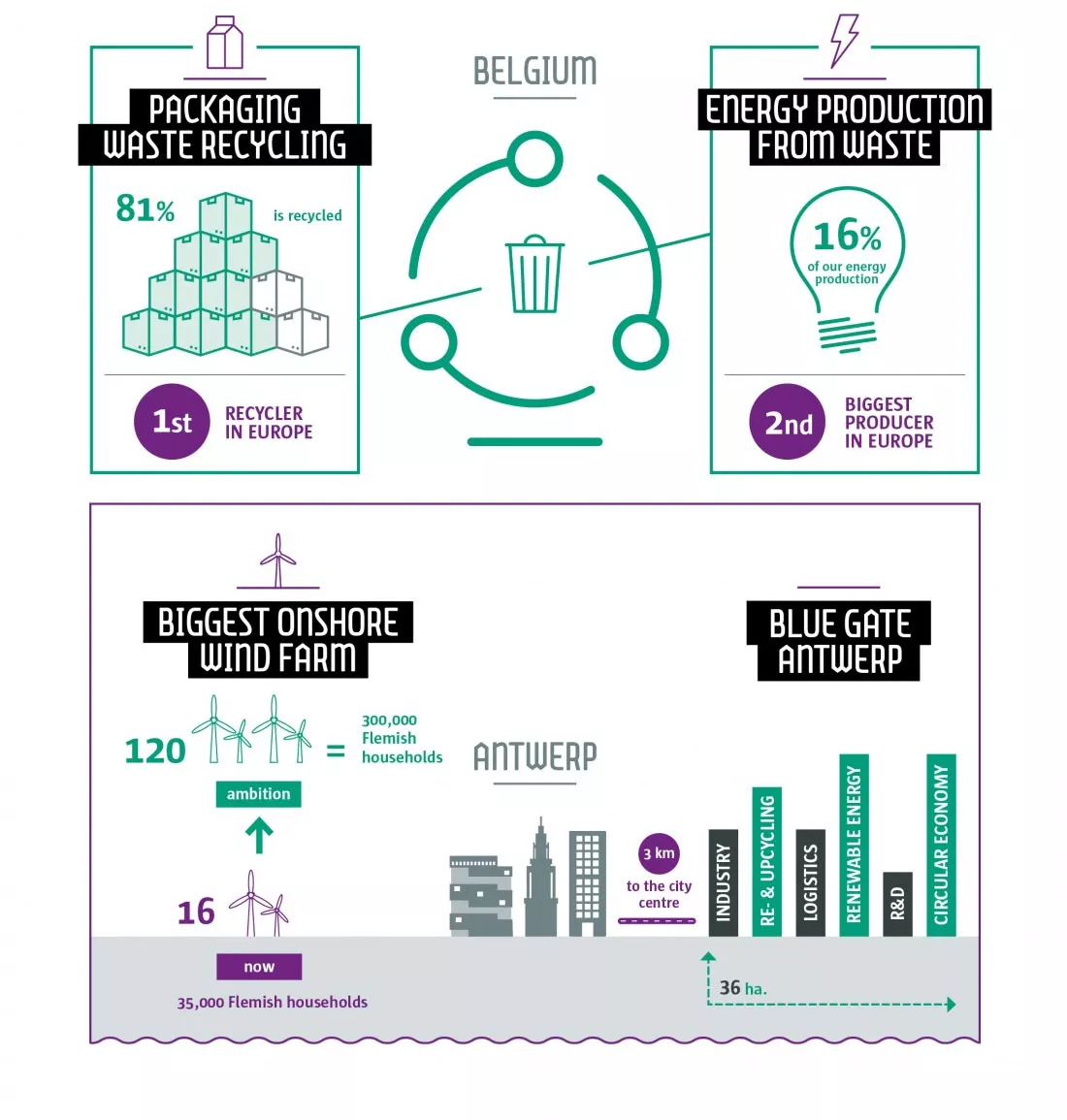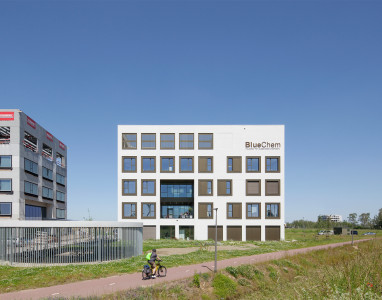
Cleantech, short for ´clean technology´, is an important growth sector because it can offer an answer to important social challenges such as climate change and shortages of raw materials. It deals with products, processes and services that, thanks to the use of innovative technology, create both an economic and a social added value through the efficient use of - as far as possible renewable - energy sources and materials.
Closing cycles is the number one task. An important element of this is the transformation of waste into new raw materials or energy. The valorisation of waste and by-product flows is oriented towards adapting or organising (industrial) processes so that waste from a given process is turned into raw material either for its own process once again or for a different process. This produces a significant cost advantage, reduces dependency on external economies and offers important environmental benefits.
Waste management
Waste management thus forms an important European and Flemish focus of attention. Under the Flemish Materials Decree, waste is no longer regarded as an end point (this is only still allowed under very strict conditions) but rather a secondary raw material or source of energy. Flanders is thus a trendsetter in materials management and an absolute leader in recycling. Flanders is number one in Europe, with 66% recycling of household waste.
Thanks to the presence of leading companies and organisations, Antwerp is the ideal location for companies and organisations that are active in waste management and cleantech.
Rich ecosystem
Antwerp has a rich and highly diversified ecosystem of specialised waste processing companies ranging from mass processing, via processing of organic/biological waste, ship waste, hazardous/toxic waste to metals. For example, Umicore is the world´s market leader in the recycling of metals: in 2012, the company was number one on the list of the 100 most sustainable companies in the world published by Corporate Knights, a Canadian independent research agency.
High industry concentration
Along with these renowned waste processing companies, Antwerp also has a high concentration of industry. Industry seeks to limit waste as much as possible or even to convert it for reuse as raw material or energy, but in addition must also often call upon the specialised knowledge and technology of the waste processing companies. Consequently, industry is a major supplier of and purchaser for the waste processing companies.
Chemical industry
One of the most important industrial suppliers and buyers for the waste processing companies is the chemical industry - which just happens to be the single largest industry in Antwerp. The chemical cluster in Antwerp is not only the second largest cluster in the world, it is also very highly integrated. Companies work together closely, including for the recovery of by-product flows.
Logistics and metal
Another important supplier for the waste processing companies is the logistics sector (packaging materials, etc.), which is also strongly present in Antwerp, in part thanks to the port, which is the second largest in Europe.
Furthermore, the metal sector is a major supplier of and above all purchaser for the waste processing companies. Here, too, Antwerp holds an important position, given that the port of Antwerp-Bruges is the number one steel port in Europe.
BlueApp
Opening in March 2022, BlueApp will be an open innovation and training hub for potential entrepreneurs and innovators from scientific institutions, large and smaller industries, which focuses on water and air, reactors for sustainable (bio)chemical conversions and material characterization.
With BlueApp, the City of Antwerp aims to strengthen the conversion of knowledge and technology into innovation in a sustainable way. BlueApp offers a physical location where state-of-the-art infrastructure including analytical instruments and pilot facilities, technical personnel and expertise are brought together and offered to researchers, starting entrepreneurs and established companies.
Located in Blue Gate Antwerp a sanitised brownfield, it is in combination with BlueChem, the beating heart of innovation in sustainable chemistry.
NextGen District
The NextGen District is an industrial site in the Port of Antwerp-Bruges, where ‘end-of-life products’ will be given a second or third life, where circular carbon solutions will be researched and where experiments will be conducted with renewable energy. It will be setting an example by giving the Circular Economy a pivotal role in its operations.
Innovators in the process and manufacturing industry bring their vision to life in the NextGen District. They design, develop and implement projects that give the circular economy a boost and are an example of real change. NextGen District is a hub where pioneers have the space to grow. Here, they are connected to a network where they exchange ideas and share resources. Think of it as a hotspot, bubbling with ideas to disrupt traditional industry, while benefiting from the same infrastructure, skilled workforce and world-class logistics services. NextGen District is the ground on which innovation manifests itself. Whether you give a second (or third) life to waste, explore circular carbon solutions, or experiment with renewable energy. NextGen District is there for those who are ready to make a difference.
Preparations for the site are ongoing. It is expected that the first industrial plan will be active by early 2023.
Click the zones on the map to discover the business parks in Antwerp.
Indaver, Sita, Groep Op de Beeck, Biogas solutions, Compofert, Kayak, Martens, Galloo, SGS EWACS, Mac², De Neef Chemical Processing (DNCP), Comet, Belgian Scrap Terminal (BST), DEME Group – Purazur, IMDC, Umicore…
![Roel Vandenbulcke [Hysopt]](https://zapdrupalfilesprod.s3.eu-central-1.amazonaws.com/bia/sites/default/files/styles/small_landscape/public/2022-11/Roel%20Vandenbulcke%20-%20Jonathan%20Ramael-3_1920x900.jpg?VersionId=idTUlfRQ5UTBAUExsV6g7wMCzDfHCZkT&h=b8626526&itok=BCDxttf5)

